Have you been wanting to get your hands on some Amazing Grass??
Don’t forget to enter my Amazing Grass giveaway! This is the first set of 3 amazing prizes that will be given away the month of July. You won’t believe what the grand prize is, either!
Also, check out the updated recipes over at Green Monster Movement!
For the SGBC today, we have a guest post by Kath from Kath Eats Real Food on the topic of Sports Nutrition! As you may know, Kath is currently training to become a Registered Dietitian to pursue her love of food and health as a career.
Take it away Kath :)
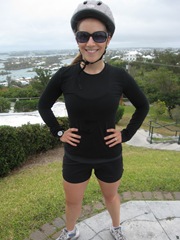 “Sprint To The Fridge”
“Sprint To The Fridge”
By Kath
Eating is supposed to be simple. Exercise is supposed to be fun! But when training for a sporting event or simply wanting to maximize your workout energy, here is some basic information to keep in mind:
Carbohydrates Are Fuel
Foods high in carbohydrate should provide the majority – 55 to 60% – of total calories for energy. Carbohydrate is the primary energy source for muscle function during exercise and helps prevent protein from being used as energy, i.e., it “spares” protein. Complex carbs in the form of whole grains are best before a workout, as they allow a slow release of energy compared to simple sugars like fruits, juices, sugar, syrups, and honey.
Before a workout, aim to have about 15 grams (1 serving) of carbohydrate. But note this: you don’t have to eat a snack if you don’t need one and are exercising for less than 90 minutes. Pre-workout fuel is important for endurance athletes or those working out for long periods of time, but you don’t really need a snack before 45 minutes on the elliptical since your liver and muscles should have plenty of stored glycogen. But if you’re stomach is rumbling – have something to tide you over.
Here are some balanced pre-workout snack ideas high in complex carbohydrates to have a few hours before a workout:
- Whole wheat toast topped with a little peanut butter and half a mashed banana
- A small bowl of cereal topped with berries and milk or yogurt
- OATMEAL! (A smaller portion so you’re not stuffed)
Enduring Endurance
For exercise lasting longer than 90 minutes (or 60 if it’s very intense), consuming 0.7 grams carbohydrate/kg body weight per hour (about 30-60 grams/hour) can extend endurance performance by preventing glycogen depletion. This is when sports drinks, gels with water and sports bars make their necessary appearance.
Protein Picks Up The Pieces
Think of protein as the repair man that comes around after the workout is over. Protein is needed to repair exercise-induced muscle damage and support gains in lean tissue mass. A hotly debated topic in sports nutrition is whether or not athletes need more protein than those who do not exercise. Well, they DO need slightly more. However, they also need more calories to fuel their workouts so while their grams per kilogram of body weight do increase, the percentage of calories that come from protein shouldn’t need to change from around 15-20%.
A post-workout snack is important to replenish the stores you burned through exercise and fuel the rest of your day. I like to plan exercise just before breakfast, lunch or dinner so I can eat a meal right after a workout. There are no strict rules, but you’ll want to include some protein, carbohydrate and fat. Calories are most important here to give you energy to keep going!
Some ideas:
- A turkey and cheese sandwich
- A salad with beans, nuts and veggies
- Tuna salad with whole grain crackers for dipping
- A green smoothie with some protein from yogurt, milk or tofu
- Yogurt with granola, nut butter and fruit
Fuel Up On Fat
Fat provides energy, essential elements of cell membranes, and fat-soluble nutrients such as vitamins A, D and E. Athletes should consume 20-30% of total calories as fat… too high or too low can have negative effects on blood lipid profiles like cholesterol, triglycerides, etc. Fat mobilized from your body’s fat stores is an important source of fuel during certain stages of exercise, and regular training improves your body’s ability to use fat as a fuel source, which is one way to help keep that glycogen level up!
Hydration
Fluids are perhaps the most important “fuel” to consider before a workout. During exercise, water is all you need for events lasting less than 1 hour, but beverages containing carbohydrate and sodium are recommended during exercise lasting longer than 1 hour.
Here are some recommendations for hydration before, during and after:
|
2 hours before event |
2 cups cold fluid |
|
15 minutes before event |
2 cups cold fluid |
|
During event, every 15-20 minutes |
4-6 oz. cold fluid (1/2-3/4 cup) |
|
After event |
2 cups fluid for every pound lost |
Despite the recommendations, the ultimate rule of sports nutrition is do what works for you (while staying hydrated!) The best way to find a pre- or post-workout snack that you like is to try different things and see how you feel. You’ll probably change preferences even depending on the time of day of your workout.
Happy sweating!
Kath
~~~~~~~~
Thanks Kath!
I think the part about fueling up on the right kind of fat is a really great point and one that we don’t hear too often! I know personally for myself, when I started consuming more healthy fats from avocados, nuts, and seeds my energy and overall satiety increased ten-fold. I used to eat the typical ‘fat-free’ diet and wonder why I was always starving and weak during my workouts. I used to be part of the camp that thought that gummy bears were awesome because they were FAT FREE! Well, I still love my candy at times, but I recognize that fat free doesn’t equal healthy. Remember when packages used to emphasize when something was fat free and we’d look at it and think it was GOOD for us? I think times are a-changing…
Now, as long as I know that I am eating healthy fats, I don’t pay much attention to how many ‘grams’ of fat I eat.
I also hope the pendulum is shifting for society’s views on carbs too. I think it is important to realize that our bodies need carbs to function, especially when we are athletes. What? You don’t think you are an athlete? Just try calling yourself one for a few days and see if that improves how you fuel your workouts! ;)
Do you think much about your fat intake and whether you are consuming bad fats or healthy fats? Did you ever used to be scared of eating things higher in fat but now you have a new outlook?




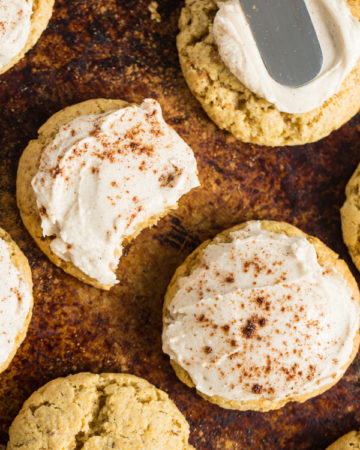
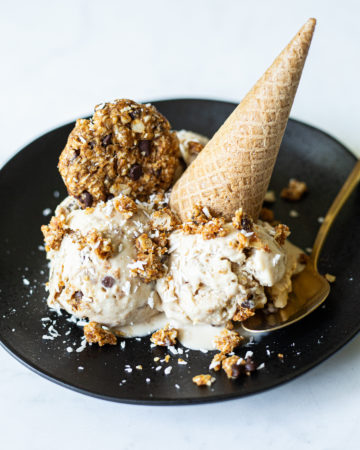
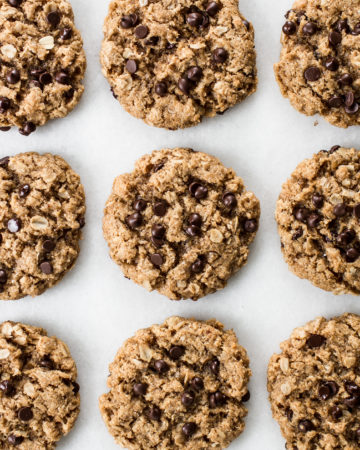
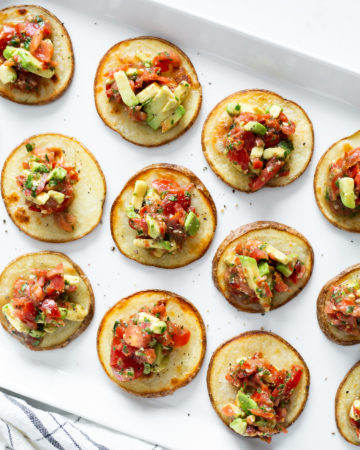
Great article Kath and thanks for sharing Angie!
I love guest post….they are fun!
I focus on good healthy fats!
Have a great day!
Pam
www.alovefornewrecipes.blogspot.com
I completely agree with the need for healthy fats. Fats were the first thing I avoided when I developed disordered eating, and this made a crankly, unsatisfied girl. My hair lost its shine, and I used to ALWAYS get compliments on my hair, and my nails were constantly brittle. I’m also amazed at how many people still think peanut butter is unhealthy for you! Yes, maybe certain kinds.. but not the natural ones!
On another note, I really struggle with hydrating before a workout. I find that if I drink too much liquid right before, even if its just one gulp too much, my stomach will feel sloshy and I’ll get a cramp once I start moving. It’s also hard for me to hydrate 2 hours in advance during my normal schedule (aka, not this summer..), because I like to work out in the morning pretty soon after I wake up. For some reason, I’m able to stomach toast and solid snacks though!
I do think about my fat intake – I recently tracked everything I ate and analyzed what aspects of my diet were strong and what I was lacking – turned out I was lacking fat! Since making more of an effort to incorporate healthy fats, I have found my skin, hair and nails have all improved greatly.
I definitely care about my intake of healthy fats- they are vital in order to achieve a healthy body and mind! I eat ground flax seeds, chia seeds, nuts, avocados and extra virgin coconut oil and extra virgin olive oil. They also add lots of yummy flava! ;)
Love this! Great article Kath.
Angela – I’m promoting your Green Monster Movement this morning!! :) I need to get myself a blender so I can submit a really good one!
Great post this morning!
Since eliminating processed foods from my diet I’ve really had a rebirth when it comes to reading the nutritional information on the food I buy. Don’t get me wrong, I still read it….but I find that first and foremost I’m looking to see the ingredients, the sugar content and the fiber content. I’m SO surprised at how easily I lost the obsession with checking fat grams. In fact, I’ve totally embraced the good fats. I really attribute that to the fact that I can absolutely notice how satiating and revitalizing a mashed avocado, a handful of cashews or Larabar is compared to a low-fat, sugar laden 100 calorie snack pack of something…
I agree with Jenn (above) – until VERY recently, I would NEVER have eaten a Larabar because of the high fat content! And I have many friends who I know still would not! I think it is going to be a gradual change for me because for soooo many years I checked nothing but fat grams, not even calories, thinking fat was all that mattered!
great article very important info! I always struggle to properly hydrate before a race!
All I know is I love almond butter and avocados and am so happy I incorporated them into my life when previously I would’ve been scared to death!! I dont count fat grams or anything like that I I do try to mentally keep track of how many servings of these kinds of fats I have per day. I dont know whats right or wrong but I aim to stay under 4 servings. So far it seems to be working!
Thanks for this interview. I really enjoyed it.
Wow I can’t believe so many of you felt the same exact way as me about fat! I remember when I was young and my disordered eating first began I tried to limit myself to 10 grams of fat a day- only later did I realize how crazy this way! Healthy fats are so amazing and I would never think about limiting my intake now. Of course balance is key, but I think it is fairly easy to do that after some practice. But yea, I used to think fat was the deveil and I too would never eat a Larabar if this was 5-10 years ago. Crazy how things change!! Glad some of you are changing in this regard too! ~A
Yes!! I don’t like it when people claim they’re on a “low-fat diet” or that all fat is bad. Yes, saturated fat and trans fat are bad–avoid those at all costs! But polyunsaturated and monounsaturated fats are really good for us (in moderation, of course). Fat has its place as the most concentrated source of fuel.
HelpMeghanRun.com
great post!
I don’t think much about my total fat intake, but I do try to make sure the majority of the fat I do have is healthy (olive oil, canola oil, nuts, avocado, etc.)
I usually try to shoot for healthy fats and don’t worry too much about them. I know I need fat to live so I just roll with the punches!
I just began to eat conciously more healthy fats recently and I’m so glad that I realized that fat is so important to our health! :)
I hate that sooo many people are tricked into thinking things are healthy because they are “fat free”! Like fat free peanut butter, what?! I focus on incorporating healthy fats into every meal and snack. It increases my satiety, keeps me full longer, and keeps my overall energy up! When I was eating more restrictively, and WAY LESS fat, my skin was dry, my hair wasn’t as healthy, and I was tired! Increasing the fat and overall calorie intake has completely reversed all of those things. Fat is our friend :] well, kinda, haha!
I’m so sick of tihnking about foods as their parts and not just as their whole; and analyzing all the given parts and numbers that go along with everything. Yes, I do look at this stuff, especially as an RN and foodie, but ever since I read Pollan’s In Defense of Food I really have started to look at food as a whole, not just the tiny parts like vitamins and antioxidants that make it great.
I dunno…
Oh yes, I was a follower of the “fat-free” craze in my early late teens early 20’s. I wouldn’t eat nuts or peanut butter to save my life! Bread however was fat free…and so was rice :) Needless to say I had no clue why I was so chubby. Now I use flax as my main source of fat but I do enjoy PB!
Larabars rule! Those are something I would have never tried years ago.
Awesome info!!! I do watch my intake of fats pretty closely. I make sure I consume a healthy dose of the good fats every day. There are so many health benefits to good fats that I could never feel guilty eating them!
xxoo
Heather
Wow! So interesting that so many of us are changing the way we think about fat and carbs! I have limited both before and NOW I have an appreciation for them. They help to fuel my active body and for that, I am thankful! Thanks for posting Kath’s article, it was very helpful.